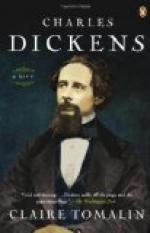in his mind. As early as 1846, after the private
reading at Lausanne, he had written to Forster:
“I was thinking the other day that in these days
of lecturings and readings, a great deal of money might
possibly be made (if it were not
infra dig.)
by one’s having readings of one’s own
books. I think it would take immensely. What
do you say?” Forster said then, and said consistently
throughout, that he held the thing to
be “
infra
dig.,” and unworthy of Dickens’ position;
and in this I think one may venture to assert that
Forster was wrong. There can surely be no reason
why a popular writer, who happens also to be an excellent
elocutionist, should not afford general pleasure by
giving sound to his prose, and a voice to his imaginary
characters. Nor is it opposed to the fitness
of things that he should be paid for his skill.
If, however, one goes further in Dickens’ case,
and asks whether the readings did not involve too
great an expenditure of time, energy, and, as we shall
see, ultimately of life, and whether he would not,
in the highest sense, have been better employed over
his books,—why then the question becomes
more difficult of solution. But, after all, each
man must answer such questions for himself. Dickens
may have felt, as the years began to tell, that he
required the excitement of the readings for mental
stimulus, and that he would not even have written
as much as he did without them. Be that as it
may, the success at Birmingham, where a sum of from
L400 to L500 was realized, the requests that poured
in upon him to read at other places, the invariably
renewed success whenever he did so, the clear evidence
that a large sum was to be realized if he determined
to come forward on his own account, all must have
contributed to scatter Forster’s objections
to the winds. On the 29th of April, 1858, at St.
Martin’s Hall, in London, he started his career
as a paid public reader, and he continued to read,
with shorter or longer periods of intermission, till
his death. But into the story of his professional
tours it is not my intention just now to enter.
I shall only stay to say a few words about the character
and quality of his readings.
That they were a success can readily be accounted
for. The mere desire to see and hear Dickens,
the great Dickens, the novelist who was more than
popular, who was the object of real personal affection
on the part of the English-speaking race,—this
would have drawn a crowd at any time. But Dickens
was not the man to rely upon such sources of attraction,
any more than an actress who is really an actress will
consent to rely exclusively on her good looks.
“Whatever is worth doing at all is worth doing
well,” such as we have seen was one of the governing
principles of his life; and he read very well.
Of nervousness there was no trace in his composition.
To some one who asked him whether he ever felt any
shyness as a speaker, he answered, “Not in the
least; the first time I took the chair (at a public




